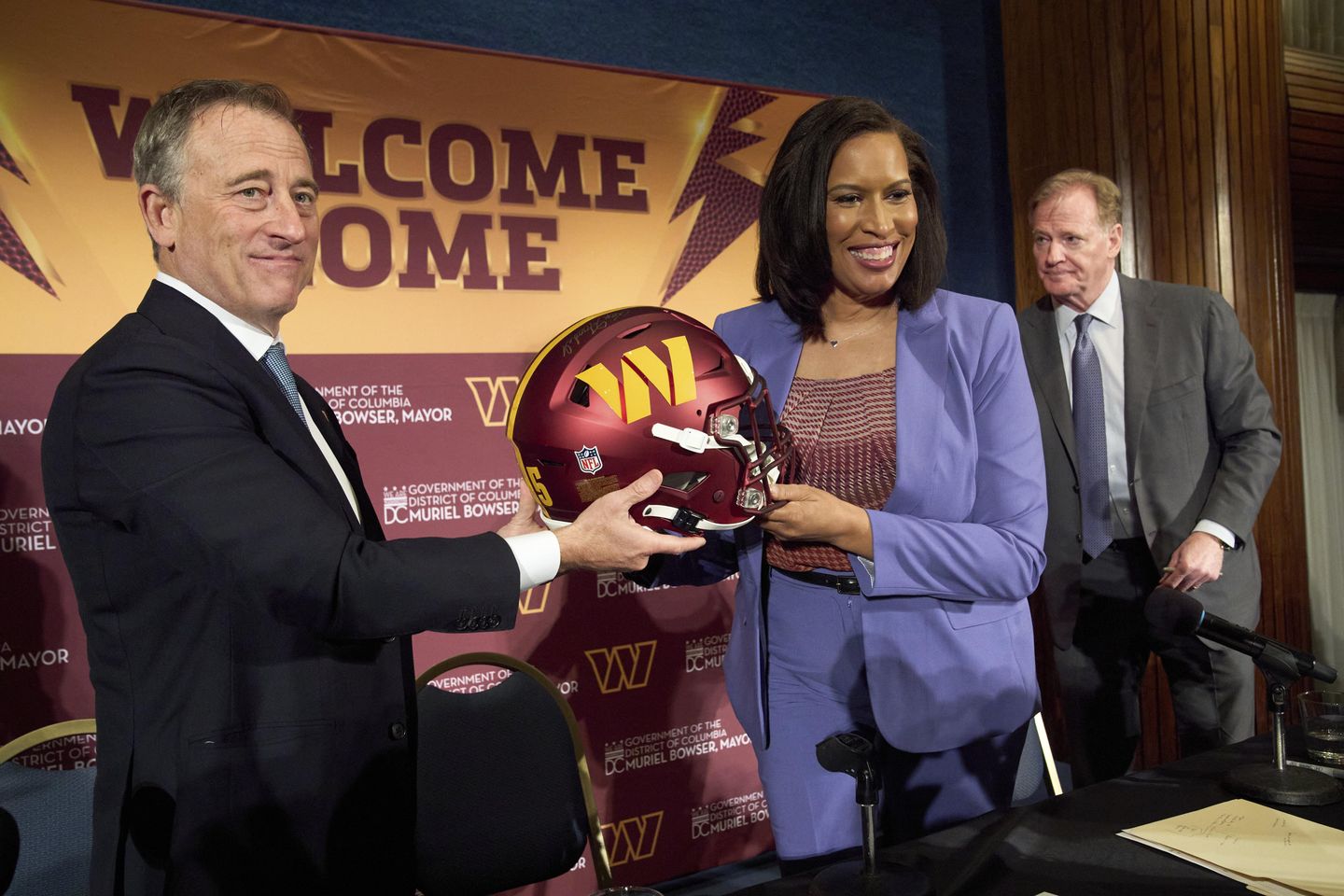
The clock is ticking for Mayor Muriel Bowser and the Washington Commanders. Based on a term sheet released last week, they have just over two months to convince the District’s city council to vote in favor of a new facility at the old RFK Stadium site.
To move forward with a fancy 65,000-seat, roofed stadium to host big-ticket events like the Super Bowl and the NCAA Final Four, Ms. Bowser has to convince at least seven councilmembers to vote yes by July 15.
She has four supporters so far.
The city council has had more than a week to consider the terms of the deal. The battle lines are drawn.
On one side, supporting legislators see $2.7 billion from the Commanders, the biggest private investment in city history. Opponents see $1 billion — the amount that local taxpayers would cough up to support local infrastructure and parking.
The mayor’s plan for the campus includes a bustling commercial district, affordable housing, green spaces and a community sportsplex alongside the stadium on a 180-acre campus.
At-large Councilmembers Kenyan McDuffie and Anita Bonds have joined Ward 2’s Brooke Pinto and Ward 7’s Wendell Felder in supporting the deal.
“It will breathe new life into an area that has been waiting far too long for real redevelopment and meaningful economic growth,” said Mr. Felder, whose jurisdiction includes the site.
Another three councilmembers, including Chairman Phil Mendelson, Ward 1’s Brianne Nadeau and Ward 6’s Charles Allen, have vocally opposed the plan.
The Commanders’ RFK Stadium proposal featured a July 15 deadline for approval from the city council, though the term sheet allows some wiggle room for the mayor’s office and the NFL franchise.
The construction timeline isn’t particularly forgiving, though.
Commanders owner Josh Harris has said he wants to move his franchise into a new stadium in time for the 2030 NFL season. Officials from the Bowser administration agreed to that timeline, with a groundbreaking ceremony planned for late next year.
But the new stadium isn’t a done deal.
Some critics of the proposal are opposed to any money being diverted to an NFL stadium.
Ms. Bowser and the Commanders tout the public-private funding split, which sees 76% of funding come from the NFL franchise, as a win for the District. Other NFL stadium projects, officials from the mayor’s office said, required jurisdictions to pay for more than half of the construction costs.
Mr. Allen called the proposal “a bad deal,” as other opponents and unconvinced legislators have taken aim at the NFL franchise’s record valuation.
“While this possibility is exciting,” Ward 4 Councilmember Janeese Lewis George, who has not confirmed whether she would support or oppose the proposal in a vote, said in a statement. “I believe meeting the needs of the people of D.C. means asking the team, valued at $6.3 billion, to be responsible for building their own home.”
The state of the District’s economy and budget is a running concern for local officials.
Ms. Bowser estimated that the city will lose 40,000 jobs due to federal layoffs, while the upcoming budget was slashed by $1 billion.
“In stark financial terms, at a time when the District is facing a recession and tens of thousands of workers are losing their jobs, this proposal is asking DC residents to pay more than $4 million for each and every home game for the next 30 years,” Mr. Allen said in a statement.
Ms. Bowser and her supporters said the District’s uncertain future is reason to support the development, not stop it.
“Our job is to replace economic activity for 40,000 people,” Ms. Bowser said after announcing the deal. “If you need to add revenue, as we do, you can’t leave 180 acres vacant. If you need to add jobs, as we do, you cannot wait for an anchor to show up and start developing.”
Undecided At-Large Councilmember Christina Henderson hasn’t thrown her support behind the deal. She did confess that the proposal was “enticing” after seeing other city-owned sites stagnate.
“I’m not interested in spending the next 20 years (nearly a quarter of our lease with the feds) debating what to do with the property,” she wrote in a newsletter to constituents. “The fact that we have a private sector entity ready to go with an investment of their own is enticing.”
But critics on the city council worry the stadium will struggle to match the impact of Capital One Arena and Nationals Park, which both average about 80 home games per year. The Commanders would play about ten games at RFK Stadium each season.
Ms. Nadeau deferred to Maryland Gov. Wes Moore’s recent comments to describe her concerns.
“Currently, we have a nearly 200-acre property that gets used eight times a year for a few hours,” he said, referring to the Commanders’ home stadium in Landover, Maryland. “I have said from my earliest days as governor that the people of the area deserve better.”
Officials from the Commanders said they’d plan to host 20 major events at the site each year. NFL games would represent half of the big-ticket offerings. The team plans to host other keynote events like the Super Bowl, Wrestlemania and the Women’s World Cup to fill out the calendar.
The plan for the site features “100+ private and other events” to flesh out the calendar, officials from the Commanders and the mayor’s office said.
The city council has two months to negotiate funding, timelines and expectations for the potential stadium. The undecided councilmembers — Henderson, George, Matthew Frumin, Zachary Parker and Robert White — will likely control RFK Stadium’s fate.












